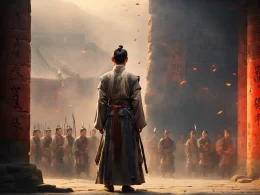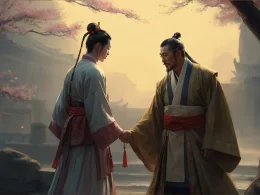Smash the pot and sink the ship. The metaphor is to give up one's last life to fight to the end.
Idiom Pronunciation:
破釜沉舟
pò fǔ chén zhōu
Origin:
《史记·项羽本纪》:“项羽乃悉引兵渡河,皆沉船,破釜甑,烧庐舍,持三日粮,以示士卒必死,无一还心。”
Story:
At the end of the Qin Dynasty, after the death of Qin Shi Huang, his youngest son Hu Hai took the throne. As Qin Shi Huang dominated the vassal states, Hu Hai also wanted to dominate the vassal states. For this reason, he sent his general Zhang Han to lead his army to defeat the rebellion of Chen Sheng and Wu Guang, and then crossed the Yellow River to attack the state of Zhao. Zhao was no match for Qin, and as a result, the Zhao army retreated to Julu and was heavily surrounded by Qin troops. So the king of Zhao sent an envoy to Chu to ask for assistance.
When the messenger arrived at Chu, he went straight to the Chu Palace to meet King Huai of Chu and cried out the atrocities of the Qin general Zhang Han's attack on Zhao. …… At that time, Xiang Yu happened to be present. Xiang Yu was furious. He said to King Huai of Chu, "We should send troops to save Zhao immediately, I am willing to fight with Zhang Han to the death ……." King Huai of Chu then appointed Song Yi as the general and Xiang Yu as the vice general to lead the army to rescue Zhao.
The king of Chu then made Song Yi the general and Xiang Yu the vice-general to lead the army to rescue Zhao, but when Song Yi arrived at Anyang, he set up camp and did not advance. Xiang Yu was very dissatisfied with this, so he demanded to march to a duel to relieve Zhao. But Song Yi wanted to wait until the Qin army was exhausted after the battle between Qin and Zhao. At this time, the army was short of food and the soldiers were in distress, and Song Yi was still drinking wine and taking care of himself. The soldiers then supported Xiang Yu as their general. Xiang Yu's killing of Song Yi shocked the state of Chu and became famous among the lords.
After killing Song Yi, Xiang Yu immediately sent his general Ying Bu and his men to lead 20,000 men to cross the Zhang River to fight the Qin general Zhang Han. When he heard that the Chu army was going to cross the river, Zhang Han sent Sima Xin and Dong Ying to lead his troops to stop them. They were no match for Ying Bu and his men. They were defeated at the first encounter and hastily retreated. So, Ying Bu and the others crossed the Zhang River without any problem and occupied the other side of the river firmly. Immediately afterwards, Xiang Yu led all his troops to cross the river.
Just after the whole army crossed the river, Xiang Yu ordered his soldiers to take only three days of dry food each, smashed all the cooking kettles, sank all the boats to cross the river, and destroyed the barracks. He said to his generals, "Success or failure is at stake. This time, we are only allowed to advance, not to retreat; we must defeat the Qin soldiers in three days. We will fight the enemy to the end, and we will not withdraw until we have won the whole battle!"
The soldiers saw that the pot had been smashed, the ship had sunk, and there was no way back, so they all fought with the determination to fight to the end. As a result, the Chu soldiers fought with one against ten, and their shouts were so loud that they were unstoppable. After nine fierce battles, the Chu army finally defeated the Qin army and saved the state of Zhao. But the other lords who came to reinforce them were too timid to come forward. After the victory, when Xiang Yu met the lords at the yamen, they did not dare to look at Xiang Yu.
Later, the phrase "all sink ships, break cauldrons" evolved into the idiom "break cauldrons and sink boats", which is a metaphor for a desperate battle with great determination.
Similar Idioms:
- 背水一战












